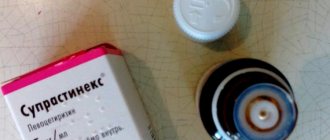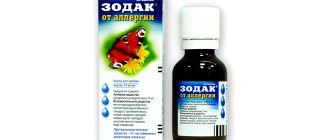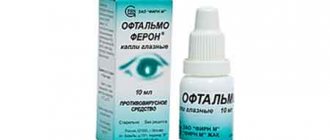Forms of release of the drug and conditions of release from pharmacies
This drug belongs to the list of drugs available without a prescription.
Cetirizine can be released in the following forms:
- In the form of round, white, film-coated tablets, biconvex in shape. Dosage 10 mg of the main substance. Available in packs of 7 and 10 pieces.
- In the form of drops - a transparent solution without color or particle impurities, homogeneous. There are 10 mg of working substance per 1 ml. Available in dark glass dropper bottles of 10 and 20 ml.
- In the form of syrup - a clear, homogeneous liquid with a banana aroma. 1 ml of the drug contains 1 mg of active substance. Available in dark glass bottles of 75 and 150 ml with a measuring spoon.
Applications and dosages
The dosage of the drug is determined individually depending on the age of the patient and the form of release of the composition used.
for adults
Adults are prescribed the drug Cetirizine in tablet form. The drug has a prolonged action. therefore, the permissible daily dose is 1 tablet. The drug in syrup form is prescribed to adults and children over 12 years of age at 10 ml per day. Cetirizine in the form of drops for oral administration - 20 drops per day. For patients suffering from renal failure, adjustment of the permissible dose is indicated.
The duration of treatment for seasonal allergies is from 3 to 6 weeks.
for children
The daily dose of Cetirizine syrup for children aged 2 to 12 years weighing less than 30 kg is no more than 5 ml per day. If the child's weight is over 30 kg, the dose should be increased to 10 ml.
Children under two years of age are recommended to take oral drops. The permissible dose is 5 drops per day. For children aged 2 to 6 years, the dose is 10 drops. For the age group from 6 to 12 years, the dose is 20 drops per day.
Instructions for use
For adults and children over 12 years of age, it is recommended to take it in tablet form. 10 mg cetirizine (1 tablet) in the evening.
For children from 6 to 12 years old, if body weight is more than 30 kg - also 1 tablet (10 mg) in the evening. if less than 30 kg, then the dosage is 5 mg (half a tablet). It is possible for children to be divided into two doses, morning and evening, 5 mg each.
It can also be taken in syrup form by adults and children over 12 years of age. The dosage is also 10 mg of the active substance (cetirizine) - that is, 2 measuring spoons (1 equals 5 mg). It is advisable to take it in the evening.
For children from 2 to 12 years old, if body weight is more than 30 kg - also 10 ml in the evening. if less than 30 kg, then the dosage is 5 ml (1 measuring spoon). It is possible to divide the dose for children into two doses, morning and evening, 5 ml each.
In the form of drops: adults and children over 12 years of age, the dosage is 10 mg in the evening (equivalent to 20 drops). For children 1-2 years old, the medicine is prescribed orally at 2.5 mg (that’s 5 drops) 2 times a day. Children 2-6 years old - also 2.5 mg (5 drops) 2 times a day in the morning and evening or 5 mg (10 drops) 1 time in the evening. Age group 6-12 years – 5 mg (10 drops) 2 times a day or immediately 10 mg (20 drops) in the evening.
If you have certain health problems, the dose of the drug may need to be adjusted. If the patient has renal failure, the amount of medication should be reduced by 2 times. Elderly people do not need to adjust the dosage.
For short-term allergen effects, it is enough to take cetirizine for a week. For example, with seasonal rhinitis of an allergic nature, treatment may require about 6 weeks for adults, and about a month for children under 12 years of age.
Pharmacological action of Cetirizine
According to the instructions, Cetirizine is a histamine H1 receptor blocker and has a pronounced antiallergic effect on the body.
The use of Cetirizine in recommended dosages has practically no sedative effect, as well as antiserotonin and anticholinergic effects. Facilitates the course of allergies and prevents their development. According to reviews, Cetirizine has antiexudative and antipruritic effects.
Affects allergic reactions at their early stages, reduces the migration of inflammatory cells. At a late stage of allergy, the release of mediators is inhibited. Reduces capillary permeability, relieves tissue swelling and smooth muscle spasms. Eliminates skin reactions to the introduction of histamine, specific allergens and cooling (for example, with cold urticaria).
In patients with bronchial asthma, Cetirizine, according to reviews, significantly reduces the hyperreactivity of the bronchial tree that occurs due to the release of histamine.
According to the instructions, Cetirizine has a therapeutic effect approximately an hour after administration.
Compound
Medicine in tablet form: active ingredient – cetirizine dihydrochloride 10 mg. excipients - magnesium stearate, lactose monohydrate, titanium dioxide, colloidal silicon dioxide and microcrystalline cellulose.
Drops: active substance cetirizine dihydrochloride 10 mg per 1 ml. benzoic acid, sodium acetate trihydrate, 85% glycerol, propylene glycol, distilled water.
Syrup: main substance – cetirizine dihydrochloride 10 mg per 1 ml. 85% glycerol, banana flavor, 20% acetic acid, 70% sorbitol, sodium saccharin, sodium acetate, propylene glycol.
CETIRIZINE (tablets)
- book).
Irritation manifests itself as standard: rhinitis, lacrimation, irritation of the skin, and in particularly difficult cases - bronchospasms. Therefore, the very first requirement for an antihistamine is: no delay! Before I had the need to choose an antihistamine, the last time I encountered an allergy was back in school age, when there were two drugs that were the same: tavegil and suprastin. The medicine, frankly, is not bad, it is effective, but it is probably already outdated and makes you sleepy. During your school years, you can still allow yourself to get enough sleep at any convenient time, but not now. Hence the second requirement - not to make you sleepy.
So, by trial and error, I have identified for myself a number of relatively new worthy anti-allergic drugs, which I will introduce you to in the Review, in case anyone finds it useful...
So, Cetirizine. This is a second generation antiallergic drug. The second generation of such drugs is also called “non-sedative”, that is, they do not cause drowsiness. Also, the group of second-generation anti-allergy drugs is distinguished by the fact that their action is designed for a day, is not addictive and quite effectively fights reactions that appear on the skin (itching, urticaria) and is therefore used for chickenpox.
This medicine is available in a package of 10 tablets:
Active ingredient: Cetirizine dihydrochloride, which contains 10 mg in each tablet. The tablets are small, film-coated; tasteless; White color:
This drug is available without a prescription. Recommendations on various sites indicate that Cetirizine can also be used to prevent allergies, that is, as a prophylaxis. According to the instructions that come with the drug, Cetirizine is indicated for: - year-round and seasonal allergic rhinitis; - conjunctivitis due to allergies; - itching, sneezing, watery eyes, urticaria; - hay fever; - allergic dermatitis.
Among the contraindications, the manufacturer lists hypersensitivity, renal failure, lactose intolerance, childhood, breastfeeding and pregnancy. With caution, this drug is intended for use by people in old age, with epilepsy, as well as with urinary retention factors.
The last time I felt the effect of this medicine on myself quite quickly: after about forty minutes the symptoms of severe allergic rhinitis began to go away, which then did not return except for a couple of cases of nasal congestion. About 12 hours later, I took another pill to prevent possible subsequent reactions. Well, the flight is normal =)
Side effect. The instructions list quite a lot of options for the manifestation of possible side effects, which I see no point in listing here, since they relate to the general condition of the body, the nervous system, the sensory organs, the cardiac system, and metabolism... In general, I advise you to read this section carefully, correlate with the condition of your body, consult a doctor. I was able to notice an increase in appetite. If we talk about drowsiness, then it is felt when taking Cetirizine every other time, but not as “killer” as after the first generation drugs.
Thus, I added this drug to my “white list”. The drug is good, worthy of attention.
Contraindications
Cetirizine is prohibited for use in the following cases:
- The patient was diagnosed with kidney disease in a decompensated state.
- Hypersensitivity to the components of the drug or intolerance to them.
- Pregnancy and breastfeeding (excreted in mother's milk).
Children over one year old can use the drug in the form of drops. The medicine is used in the form of syrup for children aged two years and older. Children over six years of age are allowed the drug in tablet form.
While taking cetirizine, you should not drink alcohol or alcohol-containing drinks, as well as drugs that have a depressant effect on the central nervous system.
Indications for use of cetirizine
Not all cetirizine-based drugs have the same indications for use. The maximum number of indications in Russia is registered for the drug Cetrin ®:
- seasonal and year-round allergic rhinitis;
- allergic conjunctivitis;
- hay fever (hay fever);
- urticaria (including chronic idiopathic);
- itchy allergic dermatoses (atopic dermatitis, neurodermatitis);
- angioedema (Quincke's edema) 2
Side effects
Usually the drug is well tolerated. Side effects that do occur are temporary.
From the nervous system (CNS): dizziness and headaches, drowsiness, possible migraine, lethargy and fatigue, or vice versa, agitation.
From the digestive system - dryness, severe thirst, stool disturbance.
It is possible to develop allergic reactions in the form of urticaria, skin itching, and swelling.
If the dosage is exceeded, the following manifestations may occur: weakness, drowsiness, inhibited consciousness, headache, irritability, rapid heartbeat, urinary disturbance in the form of retention.
In this case, symptomatic therapy, taking sorbents, gastric lavage and rest are necessary.
Side effects of Cetirizine
According to reviews, Cetirizine may cause the following side effects:
- Allergic reactions: urticaria, skin rash, angioedema, itching.
- CNS: drowsiness, dizziness, headache, migraine, agitation, fatigue.
- Digestive system: dyspepsia, dry mouth.
Positive reviews of Cetirizine indicate that the drug is generally well tolerated by patients. Usually side effects are transient.
Reviews
- Cetirizine is one of the inexpensive drugs in the pharmacy that works. My child and I have a seasonal allergy to poplar fluff. My son is 4 years old, when fluff flies, we save ourselves with this drug. I take one tablet a day, I give my son 5 drops in the evening. We tolerate it well, without side effects.
- Everyone knows that boys are a moving hurricane. My 8 year old son was stung by a bee. The bite site hurt and began to itch very much. It’s good that there was cetirizine in the medicine cabinet. After taking it it became much easier.
Analogues of the drug
A wide range of pharmacies offer medications similar in their principle of action to Cetirizine; they can replace it, if necessary. Antihistamines such as:
- Zyrtec;
- Zodak;
- Cetrin;
- Letizen;
- Allertek;
- Parlazin;
- Zintset.
Each of the medications is well tolerated by patients and quickly provides an antiallergic effect
It is very important to re-read the instructions before use to eliminate the possibility of side effects. You should not buy the above medications for yourself or be treated with medications that were prescribed to your friends with similar symptoms.
In general, patient reviews of the drug Citrine are positive, since in 98% of cases it provides a therapeutic effect within three days. Here's what people who have been treated can say about the medication:
Marina 34 years old:
I really love summer and spring, but with the onset of April, I begin to experience watery eyes, nasal congestion and a number of other unpleasant symptoms. For 4 years now, my favorite time of the year has passed with tears in my eyes. I tried different tablets for allergic rhinitis and hay fever, but, as a rule, they cause drowsiness and do little to help, eliminating only one of the symptoms. A friend recommended Cetririzine; she used it to treat her child, who was born with allergies. After consulting with the doctor, I started therapy with this medicine, and I want to say that I am very pleased with the result. For the first time in a long time, I was able to enjoy the sun, smell the flowers and lie on the grass without sneezing. Now, when seasonal allergies worsen, I immediately consume Cetirizine tablets and continue to enjoy life to the fullest.
Nadezhda 43 years old:
I suffer from seasonal allergies, from May to June I constantly receive injections, which prevent the allergy from degenerating into asthma, I am already tired of this treatment, but there is nowhere to go, the minimum course of therapy is 3 years. After this, they promise that the body will not be so sensitive to irritants. One day, while visiting another city for work, I decided to undergo additional examination with a new doctor. So to speak, hear an alternative opinion from a specialist. He advised taking 1 tablet of Cetirizine at night for a month. Since this drug does not react with other medications, side effects were excluded. If the result had not been found, I would have continued to inject, but I did not have to return to injections. Cetirizine relieved me of allergies in the shortest possible time. Now, for any disease, I consult with several specialists at once, because I know that no matter how highly qualified the doctor is, he cannot cure everything.
Directions for use and doses
The duration of therapy, as well as the dosage, should be prescribed by a doctor based on your condition and individual characteristics of the body. The optimal dose of medication for adults and children over 6 years of age is considered to be 1 tablet once a day, preferably before bedtime. If necessary, 1 tablet is divided into two doses
It is important to take the tablet with a whole glass of water, this improves absorption and speeds up the onset of the effect. In elderly patients, due to age-related renal impairment, dosage adjustment is possible; they are prescribed half a tablet once a day
If the medicine is used in the form of drops, then 10 drops per 1 teaspoon of sugar are indicated, for the elderly and people - 5 drops per 1 liter. Sahara. Sugar can be replaced with bread or half a glass of water.
Cetirizine may affect the ability to drive vehicles and perform work requiring extreme concentration. During treatment, it is necessary to protect yourself from potentially dangerous activities.










